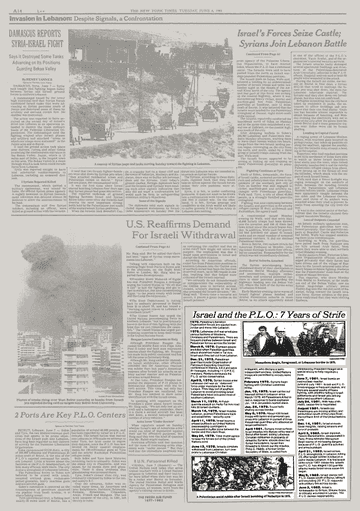1970. Palestine Liberation Organization forces are ejected from Jordan and move into Lebanon. 1975. Lebanese civil war envelopes various factions of Moslems, Christians and Palestinians. There are frequent clashes between Israeli and Palestinian forces across the border.
March 5, 1975. Eighteen people are killed when Palestian guerrillas attack shorefront hotel in Tel Aviv. Israel says they set out from Lebanon. Dec. 21, 1975. Palestinian guerrillas invade Organization of Petroleum Exporting Countries conference in Vienna, kill 3 and seize 81 hostages, including 11 O.P.E.C. ministers. Raiders denounce the P.L.O. as too conservative. April 9, 1976. Syrian troops enter Lebanese civil war as ''deterrent'' force under mandate by the Arab League. They stay out of southern Lebanon to avoid provoking Israel. Palestinians have occupied most of southern Lebanon. March 11, 1978. Al Fatah guerrilla assault on Haifa-Tel Aviv road kills 30 Israeli civilians. March 14, 1978. Israel invades Lebanon, pushes Palestinians back and establishes ''security zone.'' April 11, 1978. Israel begins a phased pullback as United Nations peacekeeping contingent is introduced in buffer zone between the border and the Litani River. May 24, 1978. Yasir Arafat agrees to keep his forces out of the United Nations zone. June 13, 1978. Israelis complete withdrawal from Lebanon, turn over posts to Lebanese Christian militiamen, who declare a semiindependent enclave. United Nations troops are permitted to occupy some sites. February 1978. Syrians begin fighting with Christian Lebanese militia. Jan. 19, 1979. Israel carries out heaviest strike in Lebanon since March 1978; 40 Palestinians killed in raid in response to bomb explosion Jan. 18 in Jerusalem market place. Jan. 24, 1979. Truce halts shelling across border. May 9, 1979. About 400 Israeli troops with tanks and armored cars cross into Lebanon in pursuit of three Palestinian guerrillas who attacked an Israeli settlement. April 1981. Syrians move surface-to-air missiles into Bekaa valley east of Beirut after Israel, aiding Lebanese Christian militiamen in jeopardy of defeat by Syrians, shoots down two Syrian helicolpters. Israel then threatens to knock out the missiles. Philip C. Habib, a former Under Secretary of State, is called from retirement by President Reagan as a special envoy to help negotiate a truce. June 7, 1981. Israel bombs an Iraqi nuclear reactor. June and July 1981. Israeli and P.L.O. forces engage in frequent clashes, and there are several weeks of heavy fighting, with shellfire falling in Israeli settlements and Israeli jets striking Beirut and southern Lebanon. July 24, 1981. With help of Mr. Habib, cease-fire is negotiated. August 1981. Israelis say Palestinians are moving artillery and ammunition south of the Litani River, the northern limit of the United Nations zone. Dec. 14, 1981. Israel annexes Golan Heights, raising tensions and furor of protests. April 3, 1982. Israeli diplomat, Yaacov Barsimantov, assassinated in Paris. Prime Minister Menachem Begin warns of increasing dangers because of P.L.O. guerrilla activities and arms buildups. April 21, 1982. Israeli strikes P.L.O. strongholds in Lebanon, killing 23, after Israeli soldier is killed on a patrol inside Lebanon. It is first Israeli strike since 1981 cease-fire. Israelis say P.L.O. has staged 130 guerrilla attacks inside Israel since cease-fire began. May 9, 1982. Israeli planes raid P.L.O. bases south of Beirut, killing 6 and wounding 20. P.L.O. responds with artillery fire across border. June 3, 1982. Israel's Ambassador to Britain, Shlomo Argov, is critically wounded in London. The P.L.O. denies responsibility.
Continue reading the main story